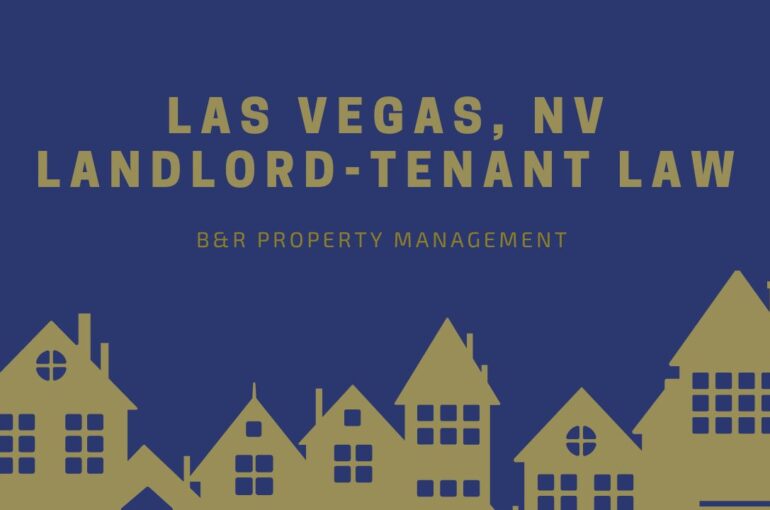Nevada Rental Laws – An Overview of Landlord-Tenant Rights in Las Vegas

In Nevada, a lease agreement can be established either orally or through a written lease document. Once the tenant starts living on your rental, the statewide landlord-tenant laws automatically kick in and grant both landlords and tenants certain rights and responsibilities.
As a real estate owner, understanding your rights and responsibilities is key to running a successful rental investment in Nevada. The following are the basics of the Nevada landlord-tenant law.
Required Landlord Disclosures in Nevada
Under landlord tenant laws of Nevada , as a landlord written notice or mandatory disclosures must be given to your tenant before they move in:
- Lead paint concentrations – If the Nevada rental was built prior to 1978, landlords must let each tenant know about lead paint concentrations in the building.
- Authorized agents – You, the landlord, have a duty to let your Nevada tenant know your contact information or of anyone managing the rental property on your behalf.
- Late fees – If you are charging fees for late unpaid rent payments, you must disclose that information on the lease.
- Utility charges – Nevada landlords are required to provide their tenants with a breakdown of the utilities in the lease agreement.
- Pending foreclosure – Landlords must notify their tenants in the event that the rental property is subject to being foreclosed upon in the future.
- The right to fly the flag – You, as the landlord, must inform tenants that they have a right to display the American flag in Nevada as long as they do so in a reasonable manner.
- Nuisance – You must notify your tenants about the penalties associated with causing a nuisance on the premises during tenancy. Make sure to include these as a lease violation in the rental agreement.
- Move-in checklist – You must provide your Nevada tenant with a checklist that outlines the property’s condition at the time of moving in.

If a landlord fails to disclose this information, either in-person or in the rental agreement, it can attract some legal consequences including being fined by a relevant government agency, or being sued for any resulting damages.
Tenant Responsibilities and Rights in Nevada
Tenants in Nevada have the following rights under the statewide landlord-tenant law. The right of tenants to:
- Be provided the aforementioned disclosures prior to signing the lease agreement and moving into the property
- Live in peace and quiet for the entire lease period or tenancy
- Live in a habitable dwelling unit for the entire tenancy
- Continue occupying the premises until the proper procedure has been followed to remove them or to end the tenancy
- Be treated fairly without any form of bias on the basis of protected classes such as race, color, religion, and familial status
- Have their security deposit returned on time. This is within 30 days after moving out
- Break the lease or rental agreement early without being penalized for certain reasons such as when joining active military service or when the dwelling unit becomes uninhabitable
- Be provided a 45-day written notice prior to an increase to rent payments
- Be served with an advance written notice of at least 24 hours prior to allowing landlord entry in the property
The list of responsibilities is as follows for Nevada tenants for the entire lease period:
- Keep the plumbing fixtures clean and sanitary in the property
- Pay rent on time every month
- Ensure the Nevada property is safe and in habitable condition
- Take care of small repairs and maintenance in the property
- Respect other tenants or neighbors’ right to peace and quiet
- Use all the appliances and facilities reasonably
- Not to cause negligent or deliberate property damage
- Serve landlords with proper notice that is written, prior to moving out
- Return the unit in the same condition they found it in, excusing normal wear and tear
- Allow landlords entry in the property as long as the reason and timing are appropriate and a notice or warning has been given

Landlords’ Rights & Responsibilities in Nevada
As a landlord in Nevada, you have the following list of rights under Nevada laws. A right to:
- The Nevada landlord may enter their tenant’s rented unit to perform needed or requested maintenance
- Initiate the eviction process or eviction notice when a tenant fails to respect their lease
- Require all prospects to undergo a bias-free tenant screening process
- Enforce the terms of the lease agreement
- Raise rent whenever and for whatever reason
- Charge whatever amount of fees for late rent payment
- A landlord may penalize a Nevada tenant for early lease termination. Please note, however, that they have a responsibility to mitigate damages
- Make allowable deductions from a tenant’s security deposit in the lease
The list of landlord responsibilities as per the Nevada laws include the following:
- Provide a tenant with a habitable dwelling
- Eviction of a tenant through a judicial eviction process in Nevada
- Abide by the laws surrounding security deposits and rent
- Abide by all terms of the lease agreement
- Treat all tenants fairly as per the Nevada Fair Housing laws and not partake in landlord harassment or landlord retaliation
- Respond to requested repairs within a period of 14 days after the request is made
Overview of the Landlord-Tenant Laws in Nevada
Landlord Entry
Nevada landlords may enter their tenants’ dwelling units. Be that as it may, there are conditions that landlords must first meet. First and foremost, landlords must have a valid reason to enter their tenant’s rental unit. Reasons landlords may enter a rented unit for are as follows:
- To inspect the unit
- To respond to a request for maintenance or repairs
- Under court orders
- In the event the tenant abandons it

Secondly, the timing must be right when entering the premises. The rules state that this must be done at “reasonable” times unless otherwise agreed upon between landlord and tenant.
And last but not least, landlords in Nevada must provide the tenant with a notice of at least 24 hours. This notice not only ensures legal complaince but also strengthens your landlord tenant relationship.
Security Deposits
The state of Nevada has a security deposit law in place that apply to both the landlord and tenant. Among other things, the rules stipulate things like:
- The limit on security deposits (3 months’ rent)
- Allowable security deposit deductions
- Penalties if the landlord fails to pay or return the security deposit on time
- The time limit to return the deposit
Housing Discrimination
The Fair Housing Act states that housing discrimination against tenants based on certain protected classes is illegal. At the federal level, the protected classes under the federal Fair Housing Act are race, color, religion, nationality, gender, physical or mental disability, and familial status. The state of Nevada also extends the federal list by adding gender identity and sexual orientation.
Rent Increases & Related Fees
The current legislation in Nevada outrightly forbids rent control. Additionally, the Dillion Rule prohibits all local jurisdictions from instituting their own rent control laws unilaterally without approval from the state. This means that landlords may charge whatever rent rate they want to their tenants.
A landlord may also be able to increase rent payment by any amount as long as they serve the tenant a 45 days notice.
Bottom Line
Having an understanding of Nevada’s state laws regarding landlords and tenants will ensure that your rental business is legally compliant. Note that these laws are subject to change so it’s vital that you remain up-to-date on them.
If you have any questions on any aspect of Nevada state law like eviction procedures or are seeking additional help with property management, B&R Property Management can help. We’re a full-service property management company specializing solely in the Las Vegas market. Get in touch TODAY to learn more about our essential services!
Disclaimer: This blog isn’t a substitute for professional legal advice from a qualified attorney.



